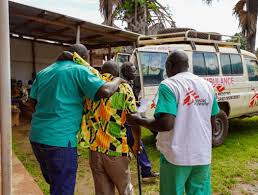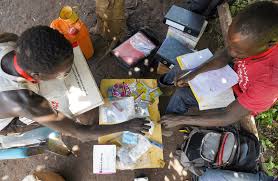…Mounting attacks on aid workers and health facilities force Médecins Sans Frontières to suspend lifesaving care, leaving thousands without access to basic healthcare.
By Bunmi Yekini

Médecins Sans Frontières (MSF) has suspended all medical activities in Yei River and Morobo counties in South Sudan’s Central Equatoria State for at least six weeks, following a shocking wave of violence that culminated in the abduction of an MSF staff member.
The incident, which occurred during an evacuation of staff from Morobo to Yei, came just four days after another abduction involving Ministry of Health personnel from an MSF ambulance on the same route. While the MSF staffer was released hours later, the organisation has described the attack as part of a disturbing and escalating trend of targeted violence against humanitarian workers in the region.
“We are outraged by this targeted attack,” said Dr. Ferdinand Atte, MSF’s Head of Mission in South Sudan. “Attacks on humanitarian workers serving the most vulnerable members of society must stop. While we are deeply committed to providing care to those in need, we cannot keep our staff working in an unsafe environment.”
According to MSF, the staffer, who was leading the convoy, was pulled from one of the four vehicles at gunpoint by armed men and dragged into nearby bushes. The other vehicles were allowed to continue to Yei. This act of violence marks the second time in three months that MSF has had to scale back operations in the area.
Dr. Atte continued, “We demand accountability and concrete guarantees from the authorities and all parties involved in the conflict, including armed groups in Morobo and Yei River counties. It is crucial to ensure safe and unobstructed access to populations in need and to protect civilians and civilian infrastructure, including healthcare workers, patients, and medical facilities, before we can consider resuming our activities.”
A Pattern of Violence
The abduction is not an isolated event. Since the start of 2025, MSF has recorded multiple attacks targeting healthcare workers and facilities across South Sudan. In Morobo alone, at least seven incidents involving the abduction of aid workers have been reported, in addition to arson, looting of hospitals, and destruction of medical infrastructure.
In January, MSF boats clearly marked as humanitarian vessels were shot at in Upper Nile State. In April, the only functioning hospital in Ulang was violently looted in broad daylight. And in May, MSF’s hospital in Old Fangak was bombed by helicopters, killing seven civilians and injuring 27 others, including four MSF staff members.
These incidents have forced MSF to shut down a growing number of projects and facilities, deeply affecting the communities they serve.
“MSF is one of the few medical organisations providing support to various healthcare facilities in this area,” Dr. Atte noted. “When such attacks occur, it is the local people who suffer the most, as it severely undermines their access to essential healthcare.”

Lives Left Hanging
In Yei River and Morobo counties, MSF had been supporting four Ministry of Health facilities, offering outpatient consultations, vaccinations, maternal care, mobile clinics, and community healthcare through the Boma Health Initiative. Between January and June 2025 alone, MSF conducted over 14,500 outpatient consultations, 1,192 antenatal consultations, and assisted 438 maternal deliveries.
Now, those services have ground to a halt.
The local population, already living in hard-to-reach, conflict-prone areas with limited infrastructure, relied almost entirely on MSF for basic healthcare.
“We never imagined this would happen,” said a local health volunteer from Morobo (name withheld for security reasons). “People here are sick, pregnant women need help, children are suffering from malaria, and now there is no one to turn to.”
A Cry for Protection
As MSF pauses its work and calls for urgent action, the message is clear: without protection for humanitarian workers, thousands will be left in the dark.
“The longer the violence continues, the greater the humanitarian cost,” Dr. Atte said. “South Sudan’s people deserve safe access to healthcare. We urge all actors to respect and protect humanitarian space.”
